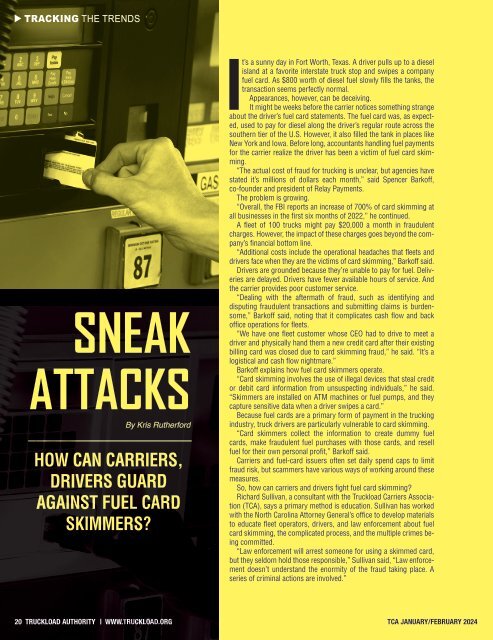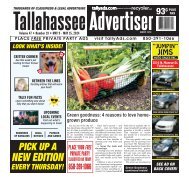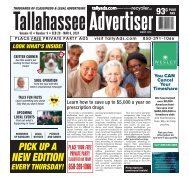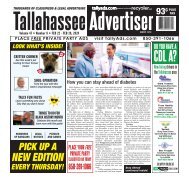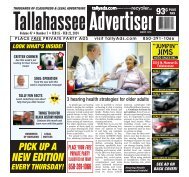TLA64_AllPages
You also want an ePaper? Increase the reach of your titles
YUMPU automatically turns print PDFs into web optimized ePapers that Google loves.
Tracking The Trends<br />
SNEAK<br />
ATTACKS<br />
By Kris Rutherford<br />
How can carriers,<br />
drivers guard<br />
against fuel card<br />
skimmers?<br />
It’s a sunny day in Fort Worth, Texas. A driver pulls up to a diesel<br />
island at a favorite interstate truck stop and swipes a company<br />
fuel card. As $800 worth of diesel fuel slowly fills the tanks, the<br />
transaction seems perfectly normal.<br />
Appearances, however, can be deceiving.<br />
It might be weeks before the carrier notices something strange<br />
about the driver’s fuel card statements. The fuel card was, as expected,<br />
used to pay for diesel along the driver’s regular route across the<br />
southern tier of the U.S. However, it also filled the tank in places like<br />
New York and Iowa. Before long, accountants handling fuel payments<br />
for the carrier realize the driver has been a victim of fuel card skimming.<br />
“The actual cost of fraud for trucking is unclear, but agencies have<br />
stated it’s millions of dollars each month,” said Spencer Barkoff,<br />
co-founder and president of Relay Payments.<br />
The problem is growing.<br />
“Overall, the FBI reports an increase of 700% of card skimming at<br />
all businesses in the first six months of 2022,” he continued.<br />
A fleet of 100 trucks might pay $20,000 a month in fraudulent<br />
charges. However, the impact of these charges goes beyond the company’s<br />
financial bottom line.<br />
“Additional costs include the operational headaches that fleets and<br />
drivers face when they are the victims of card skimming,” Barkoff said.<br />
Drivers are grounded because they’re unable to pay for fuel. Deliveries<br />
are delayed. Drivers have fewer available hours of service. And<br />
the carrier provides poor customer service.<br />
“Dealing with the aftermath of fraud, such as identifying and<br />
disputing fraudulent transactions and submitting claims is burdensome,”<br />
Barkoff said, noting that it complicates cash flow and back<br />
office operations for fleets.<br />
“We have one fleet customer whose CEO had to drive to meet a<br />
driver and physically hand them a new credit card after their existing<br />
billing card was closed due to card skimming fraud,” he said. “It’s a<br />
logistical and cash flow nightmare.”<br />
Barkoff explains how fuel card skimmers operate.<br />
“Card skimming involves the use of illegal devices that steal credit<br />
or debit card information from unsuspecting individuals,” he said.<br />
“Skimmers are installed on ATM machines or fuel pumps, and they<br />
capture sensitive data when a driver swipes a card.”<br />
Because fuel cards are a primary form of payment in the trucking<br />
industry, truck drivers are particularly vulnerable to card skimming.<br />
“Card skimmers collect the information to create dummy fuel<br />
cards, make fraudulent fuel purchases with those cards, and resell<br />
fuel for their own personal profit,” Barkoff said.<br />
Carriers and fuel-card issuers often set daily spend caps to limit<br />
fraud risk, but scammers have various ways of working around these<br />
measures.<br />
So, how can carriers and drivers fight fuel card skimming?<br />
Richard Sullivan, a consultant with the Truckload Carriers Association<br />
(TCA), says a primary method is education. Sullivan has worked<br />
with the North Carolina Attorney General’s office to develop materials<br />
to educate fleet operators, drivers, and law enforcement about fuel<br />
card skimming, the complicated process, and the multiple crimes being<br />
committed.<br />
“Law enforcement will arrest someone for using a skimmed card,<br />
but they seldom hold those responsible,” Sullivan said, “Law enforcement<br />
doesn’t understand the enormity of the fraud taking place. A<br />
series of criminal actions are involved.”<br />
20 Truckload Authority | www.Truckload.org TCA JANUARY/FEBRUARY 2024


